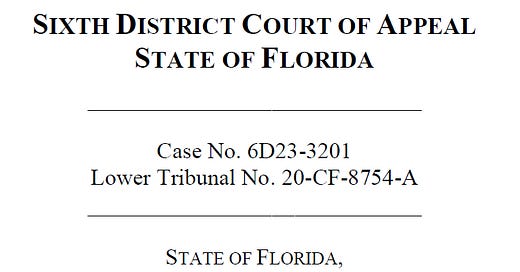Sixth DCA weighs in on Ex Post Facto issue
Last week, the Sixth District Court of Appeal issued a written opinion in State v. Lobato granting the State a writ and quashing the trial court's order related to the application of the 2023 statute.
Last week, the Sixth District Court of Appeal (Florida’s newest appellate court) issued a written opinion in State v. Lobato, in which the State appealed the “trial court’s nonfinal order denying its request to apply” Florida’s 2023 capital sentencing scheme to Lobato’s upcoming trial based on the Ex Post Facto Clauses of the U.S. and Florida Constitutions. (The trial court’s ruling is covered here.)
The opinion is authored by Judge Nardella and joined by Judge Stargel.
The Court relied on the Fifth DCA’s irreparable harm analysis in Victorino v. State to determine that the Court has jurisdiction to review the State’s petition because the State is subject to irreparable harm as a result of the trial court’s ruling. (The Fifth DCA’s opinion is covered here.)
As to whether the trial court departed from the essential requirements of law, the Court said the answer “lies not in the enacting language of the statute, which expressly provides for its immediate application, but, as Respondent argues, in the contours of the constitutional prohibition of ex post facto laws, which we now examine.” On the ex post facto analysis, the Court agreed with the Victorino Court that the change in the Florida capital sentencing statute was “‘quintessentially procedural’ in nature and has no substantive effect.”
The full opinion can be accessed here.
Judge White dissented, arguing that the State “fail[ed] to meet the rigorous requirements for th[e] extraordinary writ.”
NOTE: A similar issue is pending in State v. Riley, also pending at the Sixth DCA, in which the Court has not yet issued an opinion.



